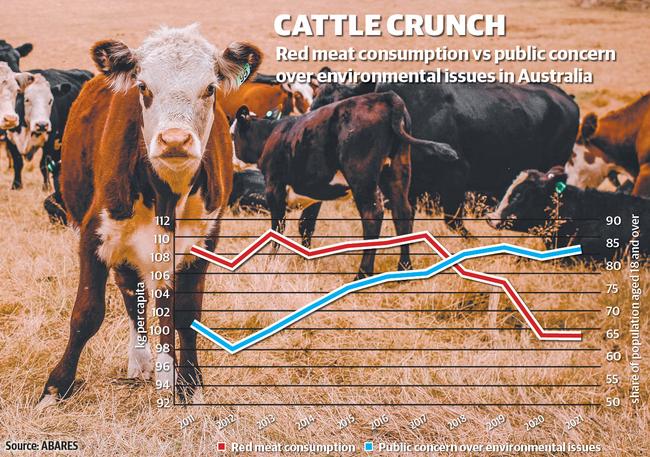Climate conscious Aussies eating less red meat and turning to plant-based food
Australian red-meat consumption has dropped to levels not seen since the 1990s — for one key reason. We takes a deeper look.
It has been 50 years since Australian agricultural exports overtook domestic consumption, driven in part by a strong red-meat industry and international hunger for quality Australian meat.
But an increasingly savvy consumer base with a focus on environmentalism and sustainability has contributed to a decline in the amount of red meat consumed domestically, at the same rate Australian red meat exports are rising.
While Australia is renowned for the quality of its red meat, national annual consumption remains “near its lowest point since 1996-97 at 99.5kg per capita”, according to a report by IBISWorld.
A move towards sustainability and ethical food consumption is driving this, according to IBISWorld, with more people moving away from red meat.

Influential voices, such as business magnate and philanthropist Bill Gates, are increasingly encouraging the general public to turn away from steak and vegetables and instead look towards alternative proteins, such as meat substitutes.
Mr Gates, in his book How to Avoid a Climate Disaster, appeals to the general public to play their part in reducing greenhouse gas emissions by trying plant-based meat products.
“Eating a meat substitute (or simply not eating meat) just once or twice a week will cut down on the emissions you’re responsible for,” Mr Gates writes.
In the year to September 2020, agriculture accounted for 14.1 per cent of Australia’s national greenhouse gas emissions, according to IBISWorld.
IBISWorld senior industry analyst Suzy Oo said an “increased awareness of the adverse relationship between red meat consumption and coronary heart disease, diabetes, and other chronic health issues” had spurred people toward a plant-based diet, expanding the target market for alternative proteins beyond vegans and vegetarians.
“The uptake of low-meat diets is expected to accelerate over the next five years,” Ms Oo said.
Grocery sales of plant-based meat alternatives increased by more than 46 per cent in 2019-20, with more than 200 plant-based products made available at supermarkets, according to alternative protein think tank Food Frontier.
“This expansion is expected to continue driving growth in the supermarkets and grocery stores industry over 2020-21, with revenue anticipated to rise by 5.1 per cent, to $121.6b,” Ms Oo said.
Australia’s livestock industry is actively working to strike back against growing concern regarding climate change and the role of red meat.
The latest Australian Beef Sustainability Framework update, launched earlier this month, reported carbon emissions from the livestock industry had halved since 2005, while the processing sector had reduced carbon dioxide emissions 8.1 per cent a tonne when processing beef, and reduced water usage by almost 8 per cent.
The livestock industry’s peak body, Meat and Livestock Australia, is also working to remedy this move away from red meat consumption in favour of alternative proteins.
A new resource for producers, Red Meat Green Facts, was recently published by MLA in a bid to better promote the sustainability and health credentials of Australian red meat.
According to MLA, consumption of red meat three to four times a week is “environmentally sustainable”, in keeping with the adoption of production and waste management strategies.
The publication also hit back at plant-based fake meat products, stating they were “highly processed”.
US writer and social media influencer, Michelle Miller, aka Farm Babe, spoke at Beef Australia 21 in Rockhampton earlier this month and said it was important the red meat industry spread the good news about agriculture and meat production.
“Remember, we’re the experts,” Ms Miller said. “There are loud activists versus the people who do this for a living.”
MORE
GENDER EQUALITY KEY TO FIGHTING BACK AGAINST ANTI-MEAT SENTIMENTS



